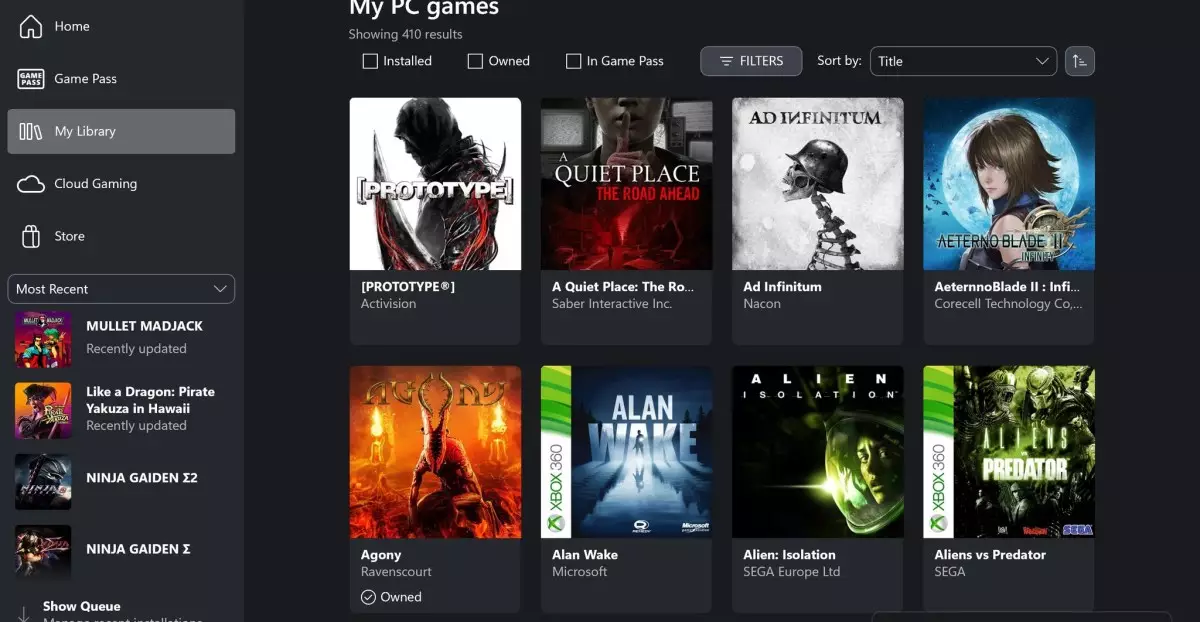Microsoft has embarked on a transformative journey to integrate its two significant platforms: Xbox and Windows. This initiative is more than just cosmetic; it’s a profound movement aimed at redefining the gaming experience for players who often oscillate between consoles and PCs. The implications of this union are extensive, promising a more inclusive and streamlined gaming ecosystem that meets the evolving needs of its audience.
Tom Warren, an esteemed tech journalist with two decades of experience in covering Microsoft-related developments, recently highlighted the early manifestations of this integration. One intriguing sighting is the shifting landscape of the Xbox PC app, which has started displaying Xbox console games within its library. It’s fascinating to note that while you may not be able to install certain titles, like “Alan Wake” from the Xbox 360 era, their availability in the app suggests an intent to foster a holistic gaming library that transcends platform boundaries.
The Strategic Vision Behind Xbox and Windows Synergy
It’s essential to recognize that what’s unfolding isn’t merely an accidental glitch in the programming. Instead, this seems to signal Microsoft’s strategic vision to create a unified gaming library for both Xbox and PC users. The move hints at a larger aspiration: making the Xbox app the go-to hub for all PC gaming, reminiscent of the global digital marketplaces that have been flourishing across the industry.
In March, Warren hinted at Microsoft’s collaboration with Asus for a new handheld gaming device known as Project Kennan. This aligns perfectly with the ongoing restructuring efforts to consolidate Xbox and Windows, signifying an extensive ambition to create a universal gaming experience across devices. The brand’s recent messaging emphasizes this shift, especially with the Xbox branding emerging prominently in announcements and trailers. It is clear that Microsoft is intent on establishing a recognizable and robust identity for Xbox on PC, a move that could resonate deeply with both dedicated gamers and casual users.
The Role of Third-party Games and Cloud Gaming
What truly elevates Microsoft’s plans is its willingness to incorporate third-party publishers into the Xbox ecosystem. Reports suggest that not only will games from its own library be featured, but titles from steam and Epic Games Store may also see representation in the Xbox PC app. Such inclusivity could radically alter consumer perceptions, inviting gamers who typically align with these platforms into the Microsoft fold. Moreover, the accidental release of mockup images showcasing Steam games within the app bolsters the likelihood of this expansive vision materializing.
One pressing question remains: will games originally designed for Xbox consoles be playable on PCs? This is where Microsoft’s cloud infrastructure could play a pivotal role. The advent of cloud gaming technology has the potential to break down long-standing barriers, allowing console-based titles to be accessible to PC gamers while bypassing traditional limitations. Unless Microsoft can demonstrate an emulation capability that allows seamless integration of older titles on modern hardware, the dream of playing classic Xbox games on PC remains a tantalizing prospect.
The Pressure of Emerging Competitors
Microsoft’s aggressive push can also be seen as a response to rising competition. As the handheld gaming market flourishes with devices powered by SteamOS, the company appears to recognize the urgency of capturing a broader gamer demographic. The gaming landscape is shifting, and with players like Lenovo and others stepping into the fray, Microsoft’s efforts may not just be about strengthening its ecosystem but also about maintaining relevance in a rapidly changing industry.
The gaming giants must constantly innovate, adapt, and respond to players’ desires and preferences. Therefore, by merging Xbox and Windows, Microsoft acknowledges the current zeitgeist that favors flexibility and portability. Gamers today are not confined to a single device, and they seek an experience that transcends format. The vision of a hybrid gaming ecosystem is compelling and could revolutionize how games are distributed, played, and enjoyed.
The merging of Xbox and Windows isn’t simply a technical upgrade; it represents a paradigm shift poised to enhance the gaming experience. As gamers anticipate what’s next, one can only imagine the possibilities that a fully integrated ecosystem could bring, bridging gaps between consoles, PCs, and handheld devices in ways that were previously unimaginable.


Leave a Reply